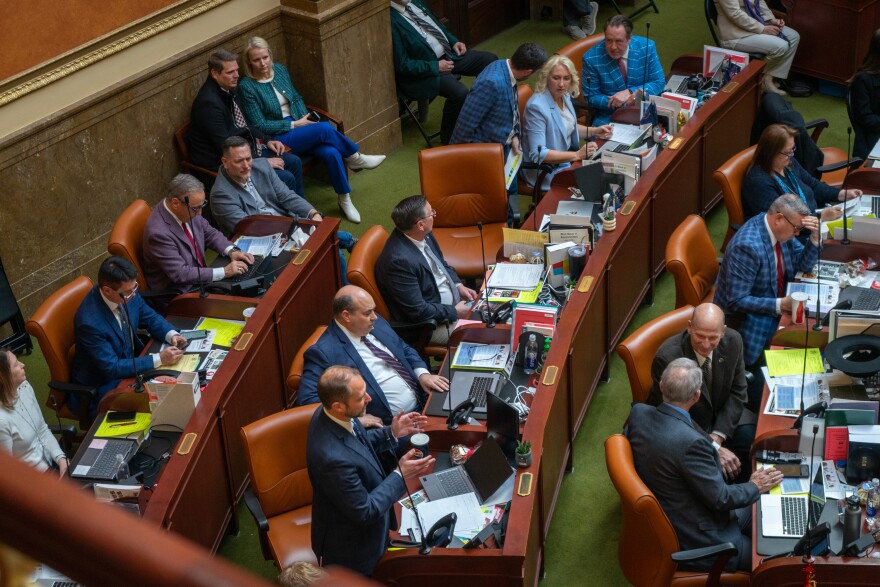Over the last five years, the Utah Legislature has passed 165 bills that increase criminal penalties. Just 34 bills in that time decreased penalties. That’s according to an analysis by the Utah Defense Attorney Association.
Its director, Steve Burton, explained that the data sheds light on the state’s approach to crime.
“It's pretty consistently showing a one-way ratchet where the political inclination is to always increase penalties and there's not a whole lot of political pressure or political desire to decrease penalties during a legislative session,” he said.
He said crime is a multi-pronged issue, and so is mitigating it on a state level.
“There's three main factors of deterrence: the certainty that there will be a consequence, the swiftness of the consequence, and then the severity of the consequence. However, the severity of the consequence has been shown to be the least effective way to deter people from committing crime.”
And crimes against people have actually gone up.
According to the Department of Public Safety, Utah has seen a 19% increase in these types of crimes between 2020 and 2024.
In the same period, property crime decreased 22%. Utah’s property crime spiked in 2020 during the pandemic, and it’s widely believed by defense attorneys and others in criminal justice that the drop since is due to statistics returning to pre-pandemic numbers.
Burton is concerned that the emphasis on increasing penalties year after year is limiting the space to focus on a long-term strategy for deterrence, one that looks at underlying factors.
“You know, what are the things that actually make somebody more likely to commit crime? It’s things like unemployment and mental health issues and substance abuse issues,” he said.
Between 2020 and 2025, approximately 102 bills were passed specifically focused on crimes categorized as being committed against people, property or society.
But Republican Rep. Karianne Lisonbee, chair of the Judiciary Committee, said there’s a reason they’ve taken a harder line recently. She said a lot of those bills were in response to a 2015 initiative.
The Justice Reinvestment Initiative aimed to take a more holistic approach to crime.
“The idea was, JRI was going to solve all of our problems by basically decriminalizing and treating people in the community and helping them not commit crimes,” she said. “What we've seen since then is that that isn't working.”
According to Lisonbee, the state is playing catch-up.
“What you're seeing is just kind of a return to common sense, the common sense of the past that was working for so many decades to say you commit a crime, then you are going to be held accountable for that crime,” she said.
Since 2020, at least 19 bills have been passed focusing on mental health services. Lisonbee said recovery services are always at the forefront of the Legislature’s mind.
“We've had many conversations; ‘are the correct services in place to help people transition from crime to not crime?’, or from addiction to a productive life, and there are some programs that are working really well, and then there are some programs that are just processing individuals through and the statistics do not bear out any efficacy in their programming,” she said.
District Attorney for Salt Lake County Sim Gill helped write the Justice Reinvestment Initiative in 2015. He said one of the proposal’s fundamentals was identifying which criminals needed incarceration and which needed rehabilitation.
“The initiative was called Justice Reinvestment Initiative, right? And what we forgot about was the reinvestment part of that.”
Gill added that the “investment was really to create the supportive infrastructure for accountability and access to resources, which data and research shows has a significant impact.”
Gill said he believes the execution of the initiative has left much to be desired, and the growing number of bills increasing criminal penalties is an emotional response to stories about crime.
“This general notion of needing to react, to say crime is rampant and we're going to increase everything, serves no one, and it is costly to the taxpayers,” he said. “It may feed our emotional desire, but it is not practically there for the objectives that we want to achieve.”
In Lisonbee‘s view, the punishment must fit the crime.
“There's no such thing as a victimless crime,” she said. “We do have designations of personal crimes. And then we have drug crimes. Those are not victimless crimes.”
During her tenure as a representative, she said she’s heard too many stories of an individual being arrested several times for minor domestic violence crimes or drug charges before being released, only to then commit more serious offenses like murder.
“Our criminal justice system should not only hold people accountable, but also help them reintegrate successfully into society, and we are not doing a good job at either, and so we can do better,” she said.






